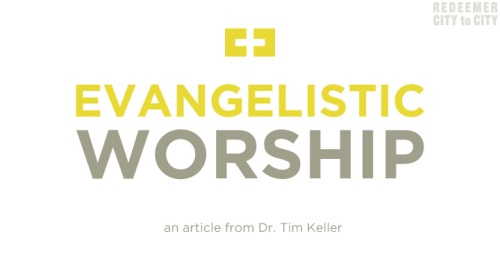
Adapted from Doctrine: What Christians Should Believe by Mark Driscoll & Gerry Breshears. theresurgence.com
Because we worship our way into sin, ultimately we need to worship our way out. When Christians commit sin, they do not cease worshiping. Rather, their worship is directed away from the Creator and toward created things. Repentance is the act of turning from sin and returning to God by trusting in Jesus Christ who is the perfect worshiper. This fact helps idolaters become transformed into worshipers. John had just this in mind when he summarized his entire epistle with the closing line, “keep yourselves from idols” (1 John 5:21).
Know your idol
Following a sermon on dating, a young woman who claimed to be a Christian who was dating, sleeping with, and living with a non-Christian came forward for prayer. She asked me to pray that God would save her boyfriend so they could marry and be a Christian family. I then quoted Romans 11:36–12:1 to her: “To him be glory forever. Amen. I appeal to you therefore, brothers, by the mercies of God, to present your bodies as a living sacrifice, holy and acceptable to God, which is your spiritual worship.” I explained to the woman that their bed was a pagan altar, and when she laid down on it with her boyfriend, she was presenting her body as a living sacrifice to the guy as her real god, and their fornication was her idolatrous worship of a created thing, namely her boyfriend. Thus, she was choosing the guy over Jesus as the most important person in her life, the basis of her identity, the source of her joy and love, and her hope for affection.
Torn between gods
A young man had suffered from panic attacks for some months and the various medications he had taken were of no help. He was a newer Christian and his family was avowedly anti-Christian and was very angry that he had converted to Christianity and that he was greatly enjoying such things as church attendance, fellowship, and Bible reading. His immediate and extended family was very close, and they had been shunning him and mocking him in an effort to get him to stop practicing his faith. When that did not work, his parents cut off his college funding, which required him to start working long hours to pay his way through school. The situation had recently escalated when his parents found out he had met a Christian woman he loved and was considering pursuing marriage with her and the two of them possibly attending seminary and preparing for a life of ministry together. His parents sat him down in front of the rest of the family and he was belittled and berated for hours. It was obvious that he loved Jesus and his family and that his anxiety was caused by being forced to choose between them.
I explained to him that his anxiety and subsequent panic attacks were the result of being conflicted between the fear of the Lord and the fear of man. Proverbs 29:25 says, “The fear of man lays a snare, but whoever trusts in the Lord is safe.” Indeed, this man’s family had set the snare he was in, as they sought to control him through the fear of man. Biblical counselor Ed Welch says:
Fear in the biblical sense . . . includes being afraid of someone, but it extends to holding someone in awe, being controlled or mastered by people, worshipping other people, putting your trust in people, or needing people. . . the fear of man can be summarized this way: We replace God with people. Instead of a biblically guided fear of the Lord, we fear others. . .When we are in our teens, it is called “peer pressure.” When we are older, it is called “people-pleasing.” Recently, it has been called “codependency”.
The only way out of his panic was to fear God as Proverbs 1:7 says, “The fear of the Lord is the beginning of knowledge.” While he should not stop loving his family, praying for his family, and honoring his parents while guarding his heart from bitterness, he needed to obey God, even if that should mean disobeying his family. If he were to obey his parents, he would be turning them into an idol above God as the true Lord of his life. Conversely, if he were to obey God, he would no longer be controlled by the idol of his family. Since he had been using them for everything from financial support to identity and approval over the years, releasing them as an idol would allow him to actually stop using them and start loving them by doing and saying what was truthful and best for them without regard for their judgment of him.
If Jesus can forgive you, you can too
A woman revealed that she had had a few abortions before becoming a Christian, marrying a godly man, and giving birth to their own healthy children. She explained that she had been tormented by her sin and did not know how to get out of the pit of despair she was living in. With tears streaming down her face, she explained how she had confessed her sin of murdering her own children to God and did believe that Jesus Christ’s death had paid her penalty and secured her forgiveness. Curiously, I explained to her that while her sin was rightly grievous, I did not understand why she was not enjoying forgiveness. She said it was because even though God had forgiven her, she could not forgive herself. I explained to her that she had become her own idol and the Lord and functional god of her life. In saying Jesus had forgiven her and she could not forgive herself, she was in effect saying she was a god above Jesus. Although her lesser God, Jesus, was forgiving, her highest god, herself, was not.
You must smash your idol, not modify your behavior
In a pastoral counseling session, a man confessed to being sexually addicted to pornography and masturbation, and was guilty of committing adultery on his wife; even engaging in homosexual sex. He had been meeting with a counselor who was not a Christian and was merely trying to modify his behavior rather than smash his idol. His questions to me were all about behavior modification and he was trying to figure out how to not have television or Internet access on the road.
To be fair, he knew that sin leads to death and that it was killing him, his wife, and their marriage. He meant well, but he had been pointed in the wrong direction in pursuit of a solution. I explained that while we need to not tempt our flesh and the changes he had made were likely good, they were not nearly enough because his real issue was not the Internet but idolatry. What he needed was not behavior modification, but worship transformation.
“Repentance is the act of turning from sin and returning to God by trusting in Jesus Christ who is the perfect worshiper. ”
In his condemnation of idolatry, Paul predicted the same lifestyle this man was living (Romans 1:25-28). Those who fail to worship God their Creator worship that which is created. This can be any created person or thing, but is often the worship of the self and sex. Why? Because, of all the things God made, the human body is the apex of God’s creative work (Genesis 1:21). This fact makes its passions and pleasures the most likely candidate for idolatrous false worship. In our age, this includes an addiction to beauty, pornography, sexual sin, drunkenness, drug abuse, people-pleasing, fear of man, and gluttony as Paul said, since for some people, their god is their stomach.
For this man, the real issue was he was worshiping the created body rather than the Creator God. He was breaking both the first and second commandments, which led to his breaking the seventh.
Your “perfect” home as an idol
Upon entering the home of an understandably tired young mother, she lamented that her house was not tidy. She also described how she had prayed to Jesus for the kids to be more organized and clean, but Jesus was of no help at all. As I looked around the house, it actually seemed quite clean and tidy for being occupied by young children. There were a few toys out on the floor, but that was about it. Later in our visit, she actually said, “Everything is perfect until the kids wreck it.”
Her home had become her idol. Whenever her children left a toy out or spilled their juice, they were not merely sinning or making a mistake. To her, they were ruining her life and vandalizing her perfect, heavenly home. Or, to say it another way, they were not worshiping her idol. So, she prayed to Jesus, asking him to turn her children into idol worshipers who never left anything out or made a mess. Her frustration with Jesus was that he did not respect her dominion in her home/kingdom and was refusing to submit to her rule and serve her idol.
Furthermore, she was making her own children miserable, with the exception of one daughter who labored to keep the house clean like her mom and berated her siblings; she was turning into a second-generation, self-righteous idol worshiper. Making matters worse, when dad got home from work, he would grab a beer, sit in his chair, watch his television, and tune out his wife and children, ignoring what was going on in the home. His idol was comfort, and his beer, chair, and flat-screen television were his functional saviors. Saviors he preferred worshiping over Jesus, who wanted him to apply the gospel to himself, his wife, and their children so they could each smash their idols and live as worshipers of God alone; waiting for the day when they get to enjoy the perfect home Jesus is preparing for us.
The human heart is an idol factory
The examples are endless because, as John Calvin rightly said, the human heart is an idol factory. Thankfully, as we seek and smash our idols by the grace of God, our lives are transformed into acts of worship to God’s glory, our joy, and others’ good as we enjoy and steward created things without deifying them, and love people rather than using them.







